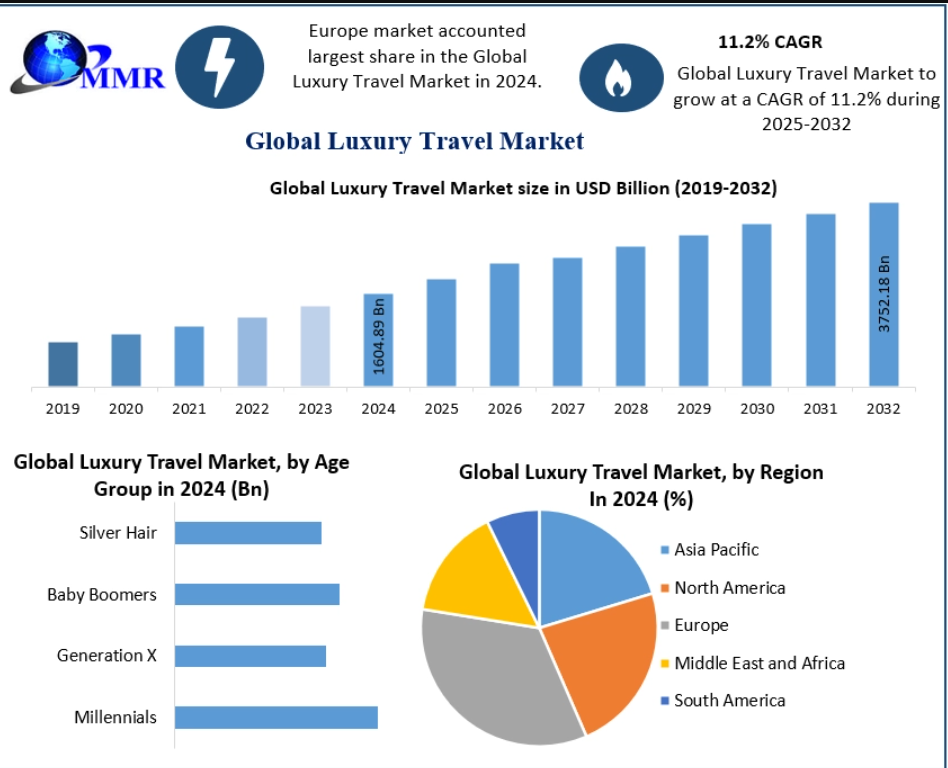Luxury Travel Market: Elevating Global Experiences
The Luxury Travel Market is redefining global tourism by combining opulence, exclusivity, and bespoke experiences. Valued at USD 1,604.89 billion in 2024, the market is projected to grow at a CAGR of 11.2% from 2025 to 2032, reaching nearly USD 3,752.18 billion. This growth is fueled by rising disposable incomes, evolving consumer preferences, and a surge in demand for unique, transformative travel experiences.
Market Overview
Luxury travel is synonymous with extraordinary experiences, high-end accommodations, personalized transport options, and authentic cultural immersion. Travelers in this segment seek exclusive facilities such as private jets, yachts, spas, gourmet cuisines, and private islands. While Europe and North America remain the most popular destinations, emerging markets such as China and India are witnessing a rapid rise in international luxury travel, driven by a growing middle and upper-middle-class population with increasing per capita income.
To know the most attractive segments, click here for a free sample of the report:https://www.maximizemarketresearch.com/request-sample/121614/
Key Market Drivers
- Demand for Unique and Exotic Experiences
Travelers increasingly seek tranquility, privacy, and culturally immersive experiences. Exotic locales, private islands, culinary tours, and adventure trips are growing in popularity. Millennials and younger travelers, in particular, prioritize food and cultural experiences, with 56% seeking culinary-focused travel experiences according to recent surveys. - Rising Middle and Upper-Class Spending
Economic growth and wealth accumulation have expanded the global upper-middle-class population. These affluent travelers are spending more on vacations, driving the luxury travel market. In the U.S., 19% of the population belongs to upper-income households, representing a major consumer base for luxury travel services. - Growth of Online Travel Booking
Digital transformation has enabled travelers to plan and book luxury trips through online platforms. Tech-savvy consumers prefer the convenience of comparing packages and pricing online. Major players like TripAdvisor, Kayak, and Hipmunk have developed advanced apps and mobile platforms to enhance the booking experience, driving market growth. - Impact of Social Media
Social media platforms influence luxury travel decisions by showcasing unique destinations, reviews, and experiences. User-generated content and influencer marketing are increasingly shaping consumer preferences, prompting luxury travel providers to offer highly personalized vacation packages.
Market Restraints
- Socio-Economic and Political Instability
Terrorism, political unrest, and civil disturbances deter travelers, negatively impacting luxury travel bookings. Safety concerns make tourists favor low-risk destinations, limiting market expansion in volatile regions. - Natural Disasters and Health Crises
Events such as hurricanes, earthquakes, and epidemics like Zika or swine flu have historically disrupted tourism, leading to cancellations and reduced travel demand. Such occurrences pose challenges for sustained market growth.
Segment Analysis
By Types of Tour:
- Adventure & Safari: The most lucrative segment, offering transformational experiences like African safaris, polar explorations, and Mediterranean sailing.
- Customized & Private Vacations: Growing in demand among high-net-worth individuals seeking bespoke itineraries.
- Cruise/Ship Expeditions, Small Group Journeys, Culinary & Shopping Tours: Popular among travelers seeking unique luxury experiences.
By Age Group:
- Baby Boomers (50–65 years) dominate luxury travel, with 4–5 trips per year and the highest discretionary income. Europe and the Caribbean are top destinations for this demographic.
By Type of Traveler:
- Absolute Luxury Travelers: Households with net worth over USD 30 million dominate the market, spending over USD 230 billion annually on luxury experiences.
By Booking Channel:
- Online Booking: Leading trend due to convenience and comparison features.
- Phone and In-Person Booking: Still relevant for personalized high-end experiences.
By Transportation Type:
- Air, Land, and Water Transportation: Private jets and yachts are preferred for exclusive trips.
To know the most attractive segments, click here for a free sample of the report:https://www.maximizemarketresearch.com/request-sample/121614/
Regional Insights
- Europe: Largest revenue contributor, with Germany and Italy being key destinations. Adventure & safari and small group journeys account for the majority of luxury travel revenue.
- North America: U.S. leads the market due to wealth concentration and outbound travel frequency; Canada and Mexico are growing due to luxury resorts and winter retreats.
- Asia-Pacific: China is the largest market, with India emerging as the fastest-growing market. Singapore and Hong Kong also contribute significantly.
- Middle East & Africa, South America: Increasing affluence and demand for exotic destinations drive market growth in these regions.
Key Players
Leading global luxury travel providers include:
- North America: Abercrombie & Kent, Micato Safaris, Tauck, BLACK TOMATO GROUP, Lindblad Expeditions
- Europe: TUI Group, Scott Dunn Ltd, Voyage Prive, Thomas Cook Group Plc
- Asia-Pacific: Cox & Kings Ltd (India)
These players focus on personalized experiences, luxury accommodations, and curated adventure tours to cater to high-net-worth travelers worldwide.
Future Outlook
The Luxury Travel Market is poised for robust growth, driven by affluent travelers seeking extraordinary experiences, digital adoption, and social media influence. As personalized travel becomes the norm, luxury travel providers will continue to innovate, offering bespoke tours, private vacations, and transformative journeys that redefine the standards of global tourism.
